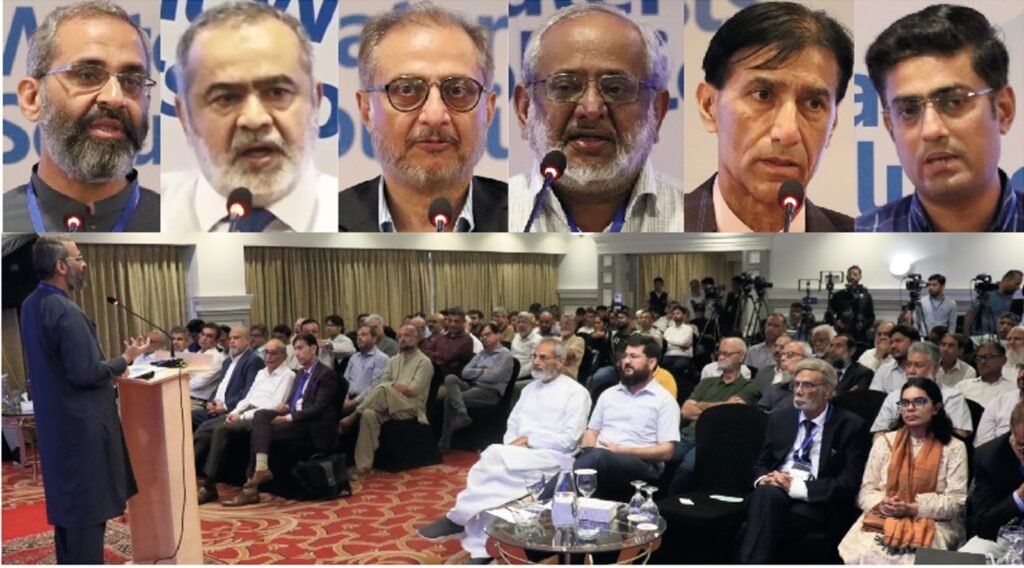As Karachi braces for another scorching summer, its perennial water crisis looms larger than ever.
The recent seminar organized by the Pakistan Engineers Forum (PEF) laid bare the harsh realities – from the tanker mafia’s stranglehold to bureaucratic inertia – while charting potential pathways to water security. The consensus was clear: Karachi’s thirst can only be quenched through urgent, collective action.
The Grim Reality
The seminar’s opening notes struck a somber tone. Javed Bilwani (President, KCCI) paid tribute to Karachiites’ resilience in enduring chronic water shortages, highlighting how water unavailability has become the new normal for Pakistan’s economic powerhouse.
Al Kazim Mansoor (Former PEF President) pulled no punches in exposing the water tanker mafia’s operations, revealing how this illegal industry has institutionalized water scarcity for profit. His revelations painted a picture of systemic exploitation where citizens pay premium prices for what should be a basic right.
Technical Solutions on the Table
The discussion then turned to potential solutions:
1. The K-4 Project: Hope Delayed
Dr. Bashir Lakhani, overseeing the crucial K-4 project, presented progress updates on this 650 MGD initiative meant to bring Indus water to Karachi. While technical hurdles were acknowledged, the bigger challenge appears to be bureaucratic red tape and funding delays that keep pushing completion timelines. He also emphasised Sindh Government’s inability to augment the distribution network for these additional 650 MGDs of water to Karachiites at their house line nozzles.
2. Groundwater Recharge: A Partial Answer
Dr. Imran Ahmed (NED University) made a compelling case for large-scale groundwater recharge systems. His presentation demonstrated how rainwater harvesting and managed aquifer recharge could supplement supplies, though he cautioned that these measures alone couldn’t meet the megacity’s massive demand.
3. The Management Deficit
Prof. Dr. Shahid Saleem analyzed the root causes of water shortages, emphasizing that while infrastructure matters, poor management exacerbates the crisis. His data showed how unplanned urbanization and outdated distribution systems lead to massive water losses.
The Corruption Elephant in the Room
Senior journalist Monis Ahmed delivered perhaps the most damning indictment, tracing how corruption permeates every level of water governance. From illegal hydrants to political patronage of tanker operations, his exposé revealed why technical solutions alone won’t solve Karachi’s water woes.
Industry Leaders Speak Out
Junaid Naqi (President, Korangi Association of Trade & Industry (KATI)) expressed frustration at the Sindh government’s neglect of Karachi, the city that welcomes and sustains millions. “Why,” he asked, “does Pakistan’s economic engine get treated this way?”
A Call for Collective Action
The seminar’s most resonant message came from Monem Zafar Khan (Jamaat Islami Karachi Chief), who stressed that water transcends political divisions. His appeal for stakeholders to unite beyond party lines struck a chord, emphasizing that Karachi’s survival depends on putting people before politics.
The Path Forward
The solutions framework that emerged demands:
• Immediate crackdown on water mafias and corrupt practices
• Fast-tracking K-4 with transparent oversight
• Large-scale conservation and recharge initiatives
• Inclusive governance involving all stakeholders
As shields were awarded and participants departed for high tea, one question lingered: Will this seminar join Karachi’s long history of forgotten dialogues, or will it spark the movement that finally brings water justice to the city? The technical solutions exist. The crisis is understood. How many more seminars will it take before Karachi gets the water it deserves? The solutions exist. The crisis is understood. What remains is the hardest part – mustering the political will to act.

